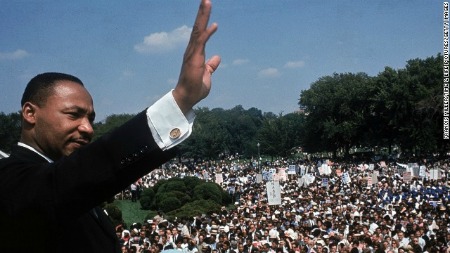 The Rev. Martin Luther King Jr. addresses a crowd near the Lincoln Memorial during the March on Washington for Jobs and Freedom on August 28, 1963. On the 50th anniversary of this historic civil rights event, we take a look back through rarely-seen color photographs from the day.
The Rev. Martin Luther King Jr. addresses a crowd near the Lincoln Memorial during the March on Washington for Jobs and Freedom on August 28, 1963. On the 50th anniversary of this historic civil rights event, we take a look back through rarely-seen color photographs from the day.
Washington (CNN) — President Barack Obama’s address Wednesday from the steps of the Lincoln Memorial will commemorate the 50th anniversary of the Rev. Martin Luther King Jr.’s “I Have a Dream” speech, representing a symbolic moment in U.S. history.
On that day in 1963, when King and his fellow marchers attended what he labeled ‘the greatest demonstration for freedom in the history of our nation,” few in that crowd could have imagined that half a century later, the first African-American president of the United States would mark the occasion with a speech in the same location.
But the two speeches are expected to be very different.
A White House official told CNN that Obama was still working on the speech late Tuesday but that the president’s remarks are expected to honor King and his ideals and not be an attempted “re-creation” of the rousing oration delivered by the legendary Baptist preacher from Atlanta.
The official said the president had spoken to several people about the speech, including Rep. John Lewis, D-Georgia, another important civil rights leader from the 1960s. Lewis is the only remaining speaker from the original 1963 march scheduled to speak at the event Wednesday.
The 50th anniversary celebration is expected to be a parade of the famous and powerful.
Former Presidents Jimmy Carter and Bill Clinton will also attend.
However, neither of the living former Republican presidents is expected to attend. George H.W. Bush and his son George W. Bush both opted out, citing health concerns. The latter is recovering from a recent heart procedure.
Celebrities and entertainers expected at the event include Forrest Whitaker and Oprah Winfrey — who star as husband and wife in one of the summer’s hottest movies, “Lee Daniels’ The Butler,” about life in the White House through the eyes of the (mostly black) hired help.
The White House was clearly seeking to keep expectations in check about the president’s speech, but the time, the place and the fact that King and Obama arguably are the two most important figures in American black history lend themselves to comparisons of the two men.
However, the Rev. Jesse L. Jackson, a contemporary of King’s who was with him the night he died, sees Obama as the finest product of the modern civil rights movement that began in the mid-1950s.
“He (Obama) is the crown jewel of that movement,” Jackson told CNN.
But Jackson also said he sees Obama in a completely different group of leaders from King.
“He is in the category of Lincoln, Roosevelt, Johnson. Dr. King is in the category of Frederick Douglass. Clarence Thomas would be in the category of Thurgood Marshall. We should not confuse his roles to that extent,” he said.
The present moment has done more than prompt comparisons between King and Obama.
It has also spurred debate over the “dream” about which King spoke so eloquently. Jackson said there was more than one dream for King and the civil rights movement before his assassination in 1968.
“The dream in ’63 was to overcome humiliation. …The dream of ’64 was public accommodations, to make that legal. The dream of ’65 was the right to vote. The dream of ’66 was fair and open housing. The dream of ’67 was a Poor People’s campaign and to choose the war on poverty over the war in Vietnam. And he was a very different person in ’68 because he was under such attacks … and he was finally killed.”
But to many, the “dream” that King articulated is — more than anything else — about racial equality and justice. And the question is how close to the goal we’ve gotten in a country that just re-elected its first black president.
Social activist Robert Woodson, who heads the Center for Neighborhood Enterprise, said the African-American community faced a completely different set of issues in the 1960s. “Our problems today are not the Klan coming in, but it is, what are we doing to ourselves?”
Woodson added, “About 10 years ago there was a Klan rally in downtown Washington, and The Washington Post asked an old black guy in (mostly black) Ward 8 — the highest crime area of the city — if he was going to join in the demonstration. He said, ‘Bring the Klan down here if they can get rid of these drug dealers.’ “
Woodson, who is black and describes himself an independent, is highly critical of the current state of civil rights advocacy. He recently addressed a meeting of the Republican National Committee, echoing some of his concerns about the movement and the state of black leadership.
“I really think it has morphed into a race-grievance industry. I think they have descended from the moral high ground that they used to occupy. And that they have become an extension of the Democratic Party,” Woodson said.
Some conservatives have criticized the 50th anniversary celebration as an exercise of liberal Democratic politics, though the organizers have said the agenda is nonpartisan.
Organized labor; lesbian, gay, bisexual and transgender groups; and opponents of “stand your ground” laws all see Wednesday’s event as an opportunity to get their messages out.
However, many Republicans have chosen to remain on the sidelines.